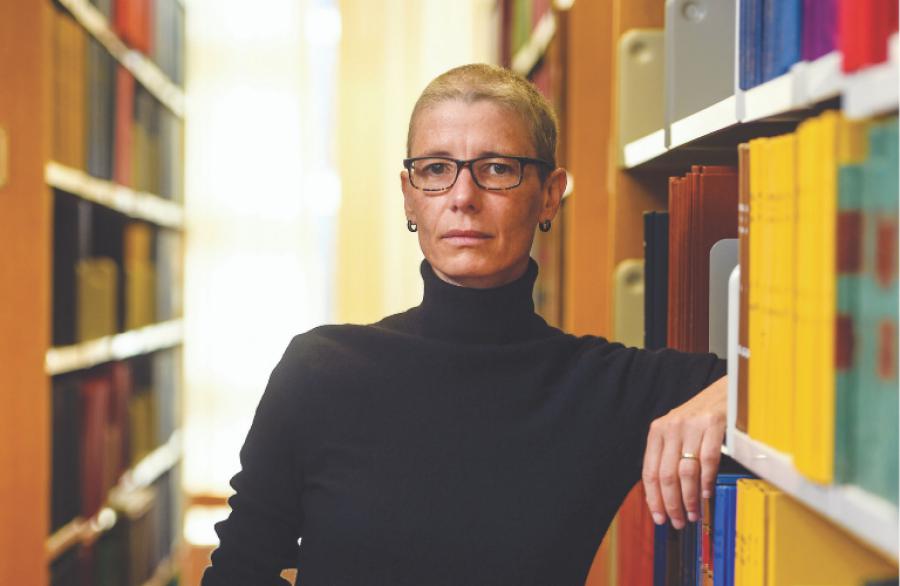Elaine Craig is an associate professor of law at Dalhousie University in Halifax. Her book “Putting Trials on Trial” analyzes transcripts of sexual assault trials in Canada to document the conduct of lawyers and judges. Will Pearson spoke to her about what’s wrong with these proceedings and how they can be improved.
Q: Why did you write this book?
A: A lot of legal scholars have identified that we have very progressive and protective law reforms aimed at improving the sexual assault trial process in Canada, but that the impact of these law reforms has been modest if not negligible. Reporting rates of rapes have stayed the same, conviction rates have stayed the same, rates of sexualized violence have stayed the same and sexual assault complainants continue to report their trial experience as brutal and traumatic. So the motivation for the book was to look at whether there are ways in which the legal profession, the lawyers and judges responsible for administering this process, are contributing in unnecessary ways to the harms experienced by these women.
Q: What kinds of problematic practices did you uncover in your research?
A: One of the surprising trends I found was the amount of evidence of complainants’ other sexual history that is being introduced without any reference to the rape-shield provisions under the Criminal Code. Questions are being asked that should be subject to the rape-shield provisions but aren’t.
Q: What are the rape-shield provisions?
A: There was an era when defence lawyers would trade on the stereotype that sexually active women were less believable or were more likely to have consented to the sex at issue in the allegation. So they trotted out all the complainant’s past sexual activities in an effort to depict her as an unchaste woman. As a consequence of that, we now shield complainants from having to answer irrelevant questions about their other sexual activities, and we shield the trial process from being distorted by introducing stereotypes that are empirically unfounded.
Q: What else did you find?
A: Complainants are questioned in unnecessarily repetitive and aggressive ways, and neither the Crown or trial judge does anything to intervene. I certainly found examples of that unnecessary bullying type of cross-examination. Asking complainants about what they were wearing. Were they wearing underwear, what colour was their underwear, those sorts of things. Questions that trade in the stereotype that real victims will fight their attacker off. And then there’s questioning that is simply rude. I encountered transcripts where the defence lawyer was clearly more polite and respectful to the other legal professionals in the room than they were to the complainant. I also found cases where trial judges appear not to have applied or perhaps even understood basic legal concepts like the definition of consent to sexual touching. I found examples of trial judges that acquit accused individuals on a basis of faulty understanding of the law, in particular a failure to understand that the definition of consent turns on whether a complainant expressed a willingness to participate in the sexual activity, not on whether the complainant said no or physically resisted.
“I can’t even begin to contemplate how difficult, how brutal this process can be for survivors of sexualized violence.”
Q: Did recent high-profile sexual assault cases, like the Jian Ghomeshi trial, influence your project?
A: Defence counsel’s conduct in that particular trial didn’t include examples of the types of arguably unethical cross-examinations that I try to document in the book. But the public focus on that trial was almost unprecedented, and it produced a lot of public commentary from members of the legal profession. One of the dominant themes I identified in that commentary was a denial that complainants continue to be subjected to these types of cross-examinations. That threw into relief for me the need to document these practices. So in the book I rely heavily on trial transcripts and specific examples in an effort to dispel some of those myths perpetuated by some defence lawyers. I think that as a profession we have to acknowledge that this does happen, and it reflects a significant failing on the part of the legal system and the legal profession.
Q: I was struck by the way you spoke of complainants serving the public, rather than themselves. Can you elaborate on that?
A: The sexual assault trial process is a public process; it’s not a private law process. Complainants have neither the right to initiate a prosecution, nor do they even have the right to refuse to participate. It’s the state who is prosecuting the accused, and the complainant is serving in that process as the state’s primary witness. We place an enormous burden on complainants to perform a very difficult role in this process. So what that suggests to me is a responsibility on the part of those administering this process to ensure that these witnesses are treated in the most humane way possible given the context.
Q: What needs to change to create a better experience for complainants?
A: I think two things need to shift. The first is that law societies need to regulate their lawyers in a way that reflects their ethical duty not to discriminate and not to unduly harass or badger witnesses. To my knowledge, there are no examples where any law society in Canada has disciplined a defence lawyer for mistreatment of a complainant. We only have examples of them having done that when lawyers are rude to one another. So, despite the fact that this type of problematic cross-examination continues to occur in some cases, law societies aren’t playing any role in attempting to diminish it.
I think the second thing that needs to happen is a shift in the defence bar culture. I did interview some defence lawyers who identified these practices as unethical, and so we need those lawyers to be more vocal and explicit about their understanding of their ethical obligations. And we need a more general shift away from the narrative that to be a great criminal defender is to defend at all costs, take no prisoners, no holds barred. That kind of cultural narrative in the criminal defence bar is unhelpful, particularly in the context of sexualized violence.
Q: Is it entirely a matter of changing the conduct of legal professionals, or do laws need to change as well?
A: I can think of a couple of laws that need to change. We need a codified definition of capacity to consent in the context of sexualized violence, for example. But absent some tweaking at the margins, our laws are pretty good, I have to say.
Q: Should trials be spaces where complainants can achieve closure?
A: I don’t want to preclude the possibility that going through this process might, for some women, include some sense of closure. But I think we have very good data to suggest most sexual assault complainants experience this process as a retraumatization. So I don’t think the therapeutic outcomes are promising. But I’m not trying to argue in this book that we should understand the criminal trial process as a therapeutic one. My aim is to point out the ways in which we could make it less traumatizing. I don’t think the criminal trial process is well suited to promoting healing. What I’m trying to do is look at the ways in which the practice and adjudication of this area of law actually make it worse, make it more traumatizing, and do so unnecessarily.
Q: How did researching and writing this book affect you?
A: This is difficult work, and I empathize with the lawyers and judges who deal with other people’s sexual trauma on a daily basis. But more so, having read these transcripts, I can’t even begin to contemplate how difficult, how brutal this process can be for survivors of sexualized violence. And so it was taxing work, and I felt tired. But I am hopeful. I’m hopeful because some of the responses to the work have been very positive. I think there may be an appetite at this particular moment to try to make some of these changes both among judges and lawyers and lawmakers, and so that’s hopeful.
This interview has been edited and condensed.
It originally appeared in The Observer’s December 2018 edition with the title “I can’t even begin to contemplate how difficult, how brutal this process can be for survivors of sexualized violence.”


Comments